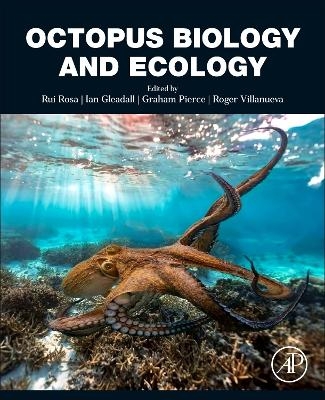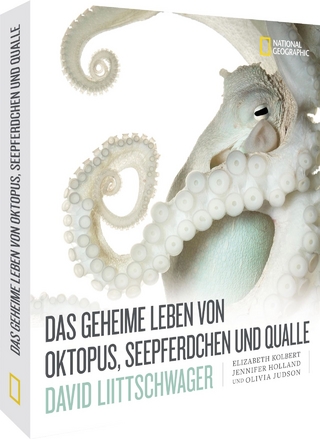
Octopus Biology and Ecology
Academic Press Inc (Verlag)
978-0-12-820639-3 (ISBN)
- Titel z.Zt. nicht lieferbar
- Versandkostenfrei
- Auch auf Rechnung
- Artikel merken
Octopus Biology and Ecology is a veritable mine of information for professional marine biologists and students alike. Octopuses are rapidly becoming a more widely exploited source of protein for human consumption, so it is important that information about their biology and ecology is available to help ensure that their exploitation will be sustainable. This book is therefore essential reading for fishery and aquaculture scientists, conservationists, and resource managers.
Rui Rosa graduated in Marine Biology by the Faculty of Sciences of the University of Lisbon (FCUL) in 1999 and completed a PhD degree in Biology by the same institution in 2005. After post-doctoral activities at the University of Rhode Island (USA), he became Senior Researcher and Auxiliary Professor at FCUL. He published 202 peer reviewed publications (h-factor of 32), 3 books and 10 book chapters. He has co-edited 2 books and conducts editorial activities in several international journals. His research seeks to understand how climate-related drivers of change affect marine biodiversity, including cephalopods. Professor, International Fisheries Science Unit, Tohoku University Graduate School of Agricultural Science, Japan Graham Pierce is a Zoology graduate (University of London, 1980) with a Masters degree in Ecology and a PhD in animal behaviour (both University of Aberdeen, 1981 and 1986). He worked as a postdoc at the University of Aberdeen until 1996, on marine mammal feeding ecology and (since 1990) cephalopod biology and ecology, then joining the University’s teaching staff and becoming Professor in 2008. He held a Marie Curie Chair at Instituto Español de Oceanografia (Vigo, Spain) during 2007-2010 and was a visiting professor at University of Aveiro (Portugal) during 2013-2016. He left Aberdeen to join IIM CSIC in 2017, and is currently Head of the Department of Marine ecology and Resources. He has published 290 papers in peer-reviewed journals as well as 40 book chapers and has co-edited four books on cephalopods. He is co-chair of the ICES Workng Group on Cephalopod Fisheries and Life History and a past President of the Cephlopod International Advisory Council. He works on the life history, ecology, exploitation and conservation of marine animals, with particular interests in cephalopods and marine mammals. Roger Villanueva graduated in Biological Sciences by the Faculty of Biology of the University of Barcelona in 1989 and obtained the PhD from the same institution in 1992 studying the ecology of cephalopods from the Benguela Current. Later, during his two-year postdoctoral stay at the Observatoire Océanologique de Banyuls, France, he discovered the beauty of the early life stages of cephalopods and these remain as one of his preferred research topics to the present. He is tenured scientist at the Institut de Ciències del Mar from 2001, he has published 60 peer-reviewed articles, 4 book chapters an co-edited one book.
Part I Introduction
1. Origin and diversification of octopuses
2. Global biodiversity and biogeography of coastal octopuses
Part II Species account
3. Octopus bimaculatus, California two-spotted octopus
4. Octopus bimaculoides, Lesser two-spotted octopus
5. Octopus cyanea, day octopus
6. Octopus insularis, stout reef octopus
7. Octopus maya, the Mayan octopus
8. Octopus mimus, the Changos’ octopus
9. ‘Octopus’ minor, long-armed octopus
10. ‘Octopus’ tehuelchus, small Patagonian octopus
11. Octopus tetricus, gloomy octopus
12. Octopus djinda, the western rock octopus
13. Octopus vulgaris, the common octopus
14. Abdopus aculeatus, the prickly octopus
15. Amphioctopus aegina, the sandbird octopus
16. Amphioctopus fangsiao, the two-gold-ring octopus
17. Hapalochlaena lunulata, greater blue-ringed octopus
18. ‘Octopus’ parvus, bean octopus
19. Eledone cirrhosa, horned octopus
20. Graneledone pacifica pacific warty octopus
21. Enteroctopus dofleini, giant Pacific octopus
22. Enteroctopus megalocyathus, Patagonian red octopus
Part III Conclusions
23. Past, present, and future trends in octopus research
| Erscheinungsdatum | 01.06.2024 |
|---|---|
| Verlagsort | San Diego |
| Sprache | englisch |
| Maße | 191 x 235 mm |
| Gewicht | 1260 g |
| Themenwelt | Naturwissenschaften ► Biologie ► Limnologie / Meeresbiologie |
| ISBN-10 | 0-12-820639-X / 012820639X |
| ISBN-13 | 978-0-12-820639-3 / 9780128206393 |
| Zustand | Neuware |
| Haben Sie eine Frage zum Produkt? |
aus dem Bereich


